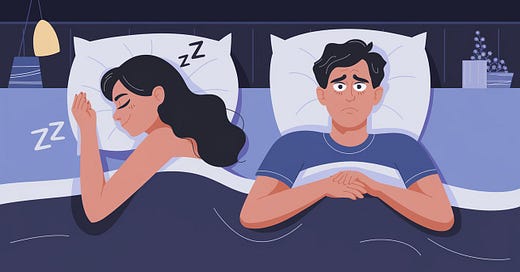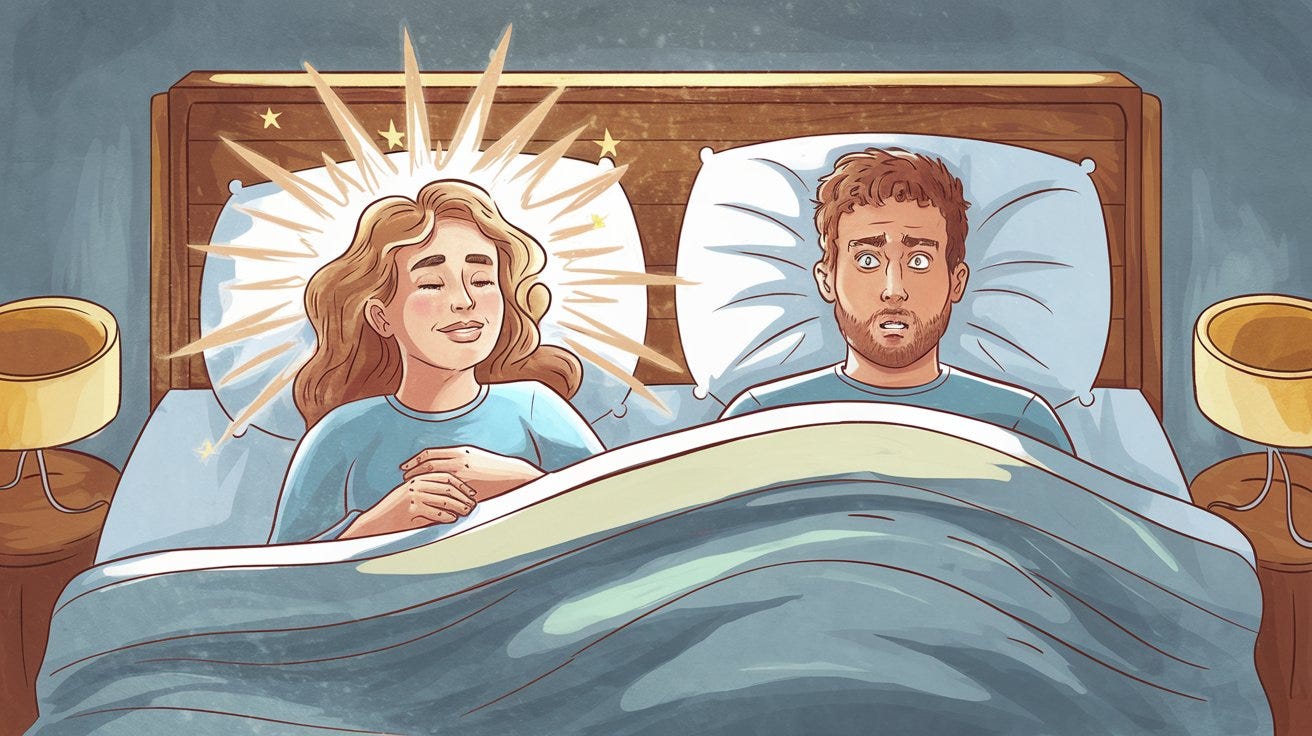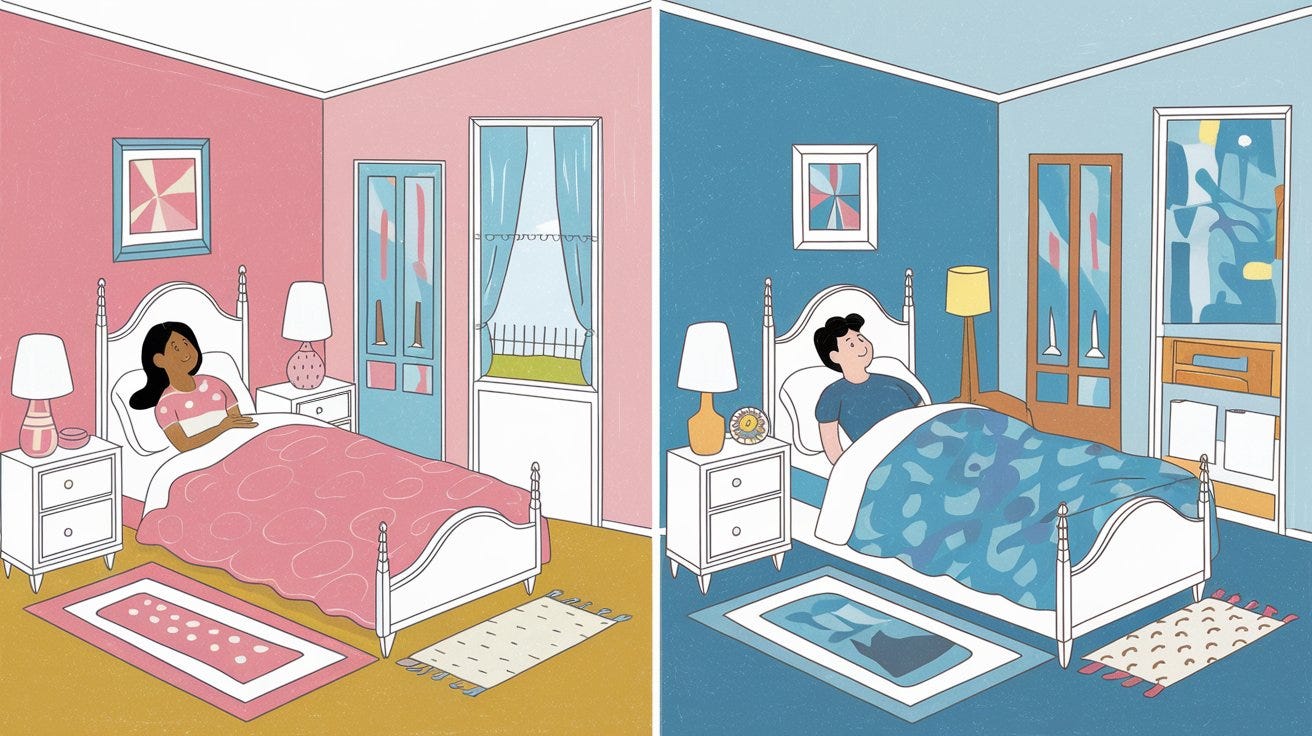Should Non-Sacral Beings Sleep Alone?
The Stigma Around Sleeping Separately
For years, societal norms and relationship experts have pushed the idea that if a couple sleeps in separate rooms, something must be wrong in their relationship.
This belief has been deeply ingrained in our culture, making many feel guilty or ashamed for wanting their own sleeping space. But what if sleeping apart isn't a sign of a failing relationship, but rather a way to promote better rest and overall well-being?
The Physical Experience of a Non-Sacral Being Sleeping Near a Sacral Being
Non-sacral beings—Manifestors, Projectors, and Reflectors—have a very different relationship with energy compared to Generators and Manifesting Generators.
When we sleep next to a sacral being, we physically feel their energy.
This can lead to what many refer to as a "sacral hangover"—a state of exhaustion caused by vibing off another person’s sacral energy for too long.
This is why many non-sacral beings benefit from sleeping alone; it allows them to fully discharge external energy and return to their natural rhythm.
The Importance of Energetic Rest Beyond Nighttime Sleep
This conversation goes beyond just nighttime rest. Generators and Manifesting Generators typically burn off their energy throughout the day and naturally fall asleep when their sacral center is depleted. But for non-sacral beings, sleep doesn’t follow the same rigid cycle. We often need naps or breaks throughout the day to regulate our energy properly. Having a space that is completely our own—a place where we can retreat for as little as four hours or as long as sixteen—is crucial for maintaining our well-being.
A Personal Perspective:
My Experience as a 4/6 Emotional Manifestor
As a Manifestor, I’ve experienced firsthand the struggle of sleeping next to a sacral being. Sleeping with my ex, a Manifesting Generator, was often an amazing experience—the warm embrace, the enveloping aura—but it was like trying to sleep while connected to a battery that never turns off. I always slept better when he would "put me to sleep" and then move to another room.
We also had very different waking and working hours. Before we started sleeping in separate rooms, he would either have to shut down early to match my schedule, leaving him feeling unfulfilled, or I would stay up later and end up getting no sleep at all. With my defined root center making me feel tired yet wired, this was an impossible cycle. Sleeping apart helped us both honor our own rhythms without compromising our connection.
The Tradition of Separate Sleeping Arrangements
Sleeping in different rooms used to be far more common than it is today.
My grandparents, for example, slept in separate rooms for as long as I can remember. My grandfather liked to turn in early, watching the news or a comedy while falling asleep. My grandmother, on the other hand, seemed to go to sleep gradually—eating, watching telenovelas, or sitting at her computer before finally heading to bed.
Their separate sleeping arrangements didn’t mean they had a bad relationship; in fact, they were married for over fifty years before my grandfather passed.
My grandmother often said their most intimate and loving moments happened in the morning when they reunited after sleeping apart. And yes, that included their sex life—something we rarely think about when considering separate sleeping spaces. (or our grandparents… But hey, if they were not “getting busy”- we would not be here).
Interestingly, I recently discovered that my grandmother was a Manifesting Generator and my grandfather was a Projector. Looking back, I remember him once saying that he slept alone because if she was in the room, he loved her so much that he simply couldn’t sleep. Now, I understand that on a deeper level.
The Benefits of Sleeping Separately for All Types
While this conversation is especially relevant for non-sacral beings, separate sleeping arrangements can benefit anyone. One partner might snore, the other might wake up frequently to use the bathroom, and the stress of disturbing each other’s sleep can be detrimental to both individuals. In the end, sleeping in separate rooms isn’t about love or commitment—it’s about ensuring each person gets the best rest possible.
What are your thoughts on sleeping separately?
Have you experienced sacral exhaustion or struggled with different sleep rhythms in your relationships? Drop a comment and let’s discuss!
Oh, and subscribe for more Human Design posts from a 4/6 manifestor:)






